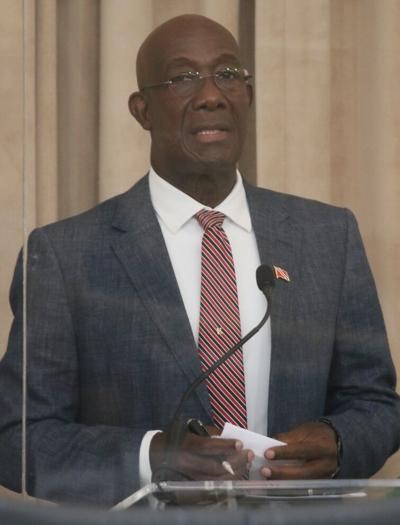(Trinidad Guardian) Prime Minister Dr Keith Rowley will not be attending the 33rd Caricom Inter-Sessional meeting which starts in Belize this morning – and which will be the first Inter-Sessional where regional leaders meet face to face since 2020.
Rowley’s non-attendance was confirmed by Government yesterday.
The Foreign Affairs Ministry subsequently confirmed that Foreign Affairs Minister Dr Amery Browne, the Ministry’s Permanent Secretary and an officer from the Ministry’s Caricom division are representing T&T.
Caricom Secretary-General Dr Carla Barnett yesterday confirmed it’s the first Inter-Sessional where leaders are meeting face to face since 2020 due to the pandemic and it’s expected many important matters including the region’s post-pandemic economic recovery will be discussed.
It’s understood that Jamaican Prime Minister Andrew Holness won’t be attending the meeting either.
Jamaica’s Foreign Ministry is representing.
Rowley returned to T&T from Qatar last Friday night. He’s yet to speak about his Qatar trip.
The day he returned, five divers attached to Tarouba-based LMCS company disappeared when an incident occurred while they were doing underwater maintenance on a pipeline at Paria Fuel Trading Company Limited. They were sucked into the pipeline.
Yesterday, Barnett said security is on the Inter-Sessional’s agenda. T&T is Caricom’s lead on security. Barnett was asked about crime as an agenda issue since Jamaica was rated number one on an international list of countries with high homicide rates, Belize at Number five and T&T, number four.
She said security is a top priority in all Caricom countries.
“Particularly because of the pandemic fallout, we see certain kinds of activities increase – transnational, cybercrime and violent crime; in the home and society,” she added
Barnett said the Russian/Ukraine conflict isn’t on the agenda but it’s a matter Caricom has been discussing and making pronouncements on. Caricom’s two statements called for calm, then a return to diplomacy to settle disputes.
She said these considerations go deeply to the core of what Caricom stands for – territorial integrity and use of diplomacy to settle matters rather than war.
Barnett said individual Caricom states issued similar calls for cessation of hostilities and return to diplomacy not only due to the wrongness of the situation’s impact on Ukraine but also on the international community and economy.
The Inter-Sessional is expected to advance Caricom’s Agri-Food systems agenda with recommendations for regional food and nutrition security with the objective of reducing the region’s food import bill.
A draft protocol will be presented to assist further Caricom and Single Market economy movement if a subset of countries can move together on the CSME even if some others aren’t ready.
Caricom will discuss how it can be more helpful in assisting Haiti. Barnett said it’s also felt Caricom needs to encourage the international community to consider the long term development plan for Haiti. Caricom isn’t at the stage of sending peacekeeping forces to Haiti since there’s no United Nations decision on that.
Barnett was asked if she was satisfied with Caricom’s human rights record since a consultant was unable to leave Suriname 500 days after they went there.
Since Suriname assumes Caricom chairmanship in July, she was asked what message Caricom was sending on human rights. Barnett said she wasn’t in a position to respond as she wasn’t aware of the specific case. She maintained Caricom has issues at various times and various places, “As a Caribbean community we tend to keep each other on the straight and narrow regarding human rights.”






